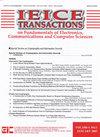基于MSD变化代价函数的动态有限变步长算法
IF 0.4
4区 计算机科学
Q4 COMPUTER SCIENCE, HARDWARE & ARCHITECTURE
Ieice Transactions on Fundamentals of Electronics Communications and Computer Sciences
Pub Date : 2023-01-01
DOI:10.1587/transfun.2023eal2069
引用次数: 0
摘要
稳态性能和收敛性能是评价自适应算法的重要指标。步长直接影响这两个重要指标。许多相关学者也提出了一些变步长自适应算法来提高性能。但是,现有的变步长自适应算法还存在理论分析不足、性能不平衡、参数不可达等问题。这些问题极大地影响了某些算法的实际性能。因此,我们打算在本文中进一步探讨关键性能与步长之间的内在关系。采用均方偏差方差(MSD)作为代价函数。在理论分析和推导的基础上,提出了一种基于动态极限函数(DLF)的变步长算法。同时,对权重偏差和收敛稳定性进行了充分的理论分析。在不同的环境下,用一些典型算法对所提出的算法进行了测试。理论分析和实验结果都证明了该算法具有较好的性能。本文章由计算机程序翻译,如有差异,请以英文原文为准。
Dynamic Limited Variable Step-Size Algorithm Based on the MSD Variation Cost Function
The steady-state and convergence performances are important indicators to evaluate adaptive algorithms. The step-size affects these two important indicators directly. Many relevant scholars have also proposed some variable step-size adaptive algorithms for improving performance. However, there are still some problems in these existing variable step-size adaptive algorithms, such as the insufficient theoretical analysis, the imbalanced performance and the unachievable parameter. These problems influence the actual performance of some algorithms greatly. Therefore, we intend to further explore an inherent relationship between the key performance and the step-size in this paper. The variation of mean square deviation (MSD) is adopted as the cost function. Based on some theoretical analyses and derivations, a novel variable step-size algorithm with a dynamic limited function (DLF) was proposed. At the same time, the sufficient theoretical analysis is conducted on the weight deviation and the convergence stability. The proposed algorithm is also tested with some typical algorithms in many different environments. Both the theoretical analysis and the experimental result all have verified that the proposed algorithm equips a superior performance.
求助全文
通过发布文献求助,成功后即可免费获取论文全文。
去求助
来源期刊

CiteScore
1.10
自引率
20.00%
发文量
137
审稿时长
3.9 months
期刊介绍:
Includes reports on research, developments, and examinations performed by the Society''s members for the specific fields shown in the category list such as detailed below, the contents of which may advance the development of science and industry:
(1) Reports on new theories, experiments with new contents, or extensions of and supplements to conventional theories and experiments.
(2) Reports on development of measurement technology and various applied technologies.
(3) Reports on the planning, design, manufacture, testing, or operation of facilities, machinery, parts, materials, etc.
(4) Presentation of new methods, suggestion of new angles, ideas, systematization, software, or any new facts regarding the above.
 求助内容:
求助内容: 应助结果提醒方式:
应助结果提醒方式:


